Kathleen Jones's Blog, page 24
January 28, 2016
In Search of the Sun
The ground floor of the Mill is currently humming with de-humidifiers. In my bedroom overhead, it's like sleeping in the cargo hold of a jumbo jet. But I'm not complaining! Every pulse gets the place drier and drier - or it would if the jet stream wasn't dumping storm after storm across Cumbria. The panic you feel whenever the river surges towards the doorstep is exhausting - and it seems to happen at least twice a week.
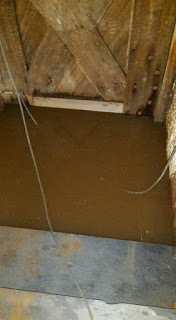 River creeping under back door on Tuesday night. Fortunately only made it up a couple of steps!Tonight the wind is howling over the roof and the rain is pelting down above my head as I'm typing this up in my attic room. But I don't care. Tomorrow I'm off to Italy for a few days in search of the sun and some much needed R & R. The river can do what it likes!
River creeping under back door on Tuesday night. Fortunately only made it up a couple of steps!Tonight the wind is howling over the roof and the rain is pelting down above my head as I'm typing this up in my attic room. But I don't care. Tomorrow I'm off to Italy for a few days in search of the sun and some much needed R & R. The river can do what it likes!
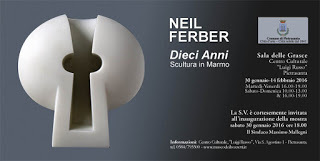 An invitation to celebrate ten years of chipping marble into shapes like this.The excuse is that Neil has been given an exhibition by the Commune of Pietrasanta, in a gallery on the corner of the Piazza. He's been very busy for the past couple of weeks, polishing and painting and constructing stands and lugging heavy bits of marble down the main street on a barrow. Saturday night is the official opening and I can't not be there to celebrate with him. So, tomorrow evening (storms permitting) I will be on a plane to Italy with my best frock in a suitcase.
An invitation to celebrate ten years of chipping marble into shapes like this.The excuse is that Neil has been given an exhibition by the Commune of Pietrasanta, in a gallery on the corner of the Piazza. He's been very busy for the past couple of weeks, polishing and painting and constructing stands and lugging heavy bits of marble down the main street on a barrow. Saturday night is the official opening and I can't not be there to celebrate with him. So, tomorrow evening (storms permitting) I will be on a plane to Italy with my best frock in a suitcase.
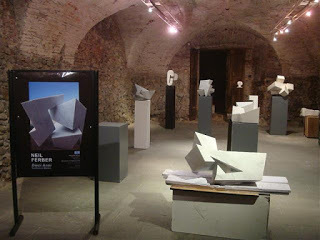 An exhibition under construction.
An exhibition under construction.
The floods and their financial knock-on effects have been life-changing for us and there's a feeling that nothing is secure now. What we need is some art-loving millionaire to turn up with a blank cheque!!!
 River creeping under back door on Tuesday night. Fortunately only made it up a couple of steps!Tonight the wind is howling over the roof and the rain is pelting down above my head as I'm typing this up in my attic room. But I don't care. Tomorrow I'm off to Italy for a few days in search of the sun and some much needed R & R. The river can do what it likes!
River creeping under back door on Tuesday night. Fortunately only made it up a couple of steps!Tonight the wind is howling over the roof and the rain is pelting down above my head as I'm typing this up in my attic room. But I don't care. Tomorrow I'm off to Italy for a few days in search of the sun and some much needed R & R. The river can do what it likes! An invitation to celebrate ten years of chipping marble into shapes like this.The excuse is that Neil has been given an exhibition by the Commune of Pietrasanta, in a gallery on the corner of the Piazza. He's been very busy for the past couple of weeks, polishing and painting and constructing stands and lugging heavy bits of marble down the main street on a barrow. Saturday night is the official opening and I can't not be there to celebrate with him. So, tomorrow evening (storms permitting) I will be on a plane to Italy with my best frock in a suitcase.
An invitation to celebrate ten years of chipping marble into shapes like this.The excuse is that Neil has been given an exhibition by the Commune of Pietrasanta, in a gallery on the corner of the Piazza. He's been very busy for the past couple of weeks, polishing and painting and constructing stands and lugging heavy bits of marble down the main street on a barrow. Saturday night is the official opening and I can't not be there to celebrate with him. So, tomorrow evening (storms permitting) I will be on a plane to Italy with my best frock in a suitcase. An exhibition under construction.
An exhibition under construction.The floods and their financial knock-on effects have been life-changing for us and there's a feeling that nothing is secure now. What we need is some art-loving millionaire to turn up with a blank cheque!!!
Published on January 28, 2016 09:36
January 26, 2016
Tuesday Poem: Norman MacCaig - Aunt Julia
Aunt Julia spoke Gaelic
very loud and very fast.
I could not answer her —
I could not understand her.
She wore men's boots
when she wore any.
— I can see her strong foot,
stained with peat,
paddling with the treadle of the spinning-wheel
while her right hand drew yarn
marvellously out of the air.
Hers was the only house
where I've lain at night
in the absolute darkness
of a box bed, listening to
crickets being friendly.
She was buckets
and water flouncing into them.
She was winds pouring wetly
round house-ends.
She was brown eggs, black skirts
and a keeper of threepennybits
in a teapot.
Aunt Julia spoke Gaelic
very loud and very fast.
By the time I had learned
a little, she lay
silenced in the absolute black
of a sandy grave
at Luskentyre. But I hear her still, welcoming me
with a seagull's voice
across a hundred yards
of peatscrapes and lazybeds
and getting angry, getting angry
with so many questions
unanswered.
© the estate of Norman MacCaig
from The Scottish Poetry Library
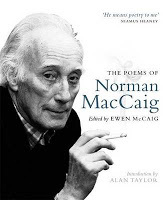 This week is the twentieth anniversary of the death of Norman MacCaig, one of Scotland's foremost poets, so I thought it was fitting to have one of his poems to celebrate the life and work of a poet whose poetry is gradually slipping out of view beyond the Scottish borders. 'Aunt Julia' is one of my favourites partly because it depicts such a wonderful character, (I can see her strong foot/stained with peat) and partly because it identifies one of the most tragic aspects of Scottish history.
This week is the twentieth anniversary of the death of Norman MacCaig, one of Scotland's foremost poets, so I thought it was fitting to have one of his poems to celebrate the life and work of a poet whose poetry is gradually slipping out of view beyond the Scottish borders. 'Aunt Julia' is one of my favourites partly because it depicts such a wonderful character, (I can see her strong foot/stained with peat) and partly because it identifies one of the most tragic aspects of Scottish history.
Norman MacCaig's Aunt Julia, like his mother, came from the Isle of Harris and had Gaelic as a first language. Norman, like the majority of his generation, spoke English. It is one of the clearest examples of the cultural colonialism practised within the British Empire. Stamping out the language was a deliberate attempt to wipe out the culture and with it the connections to communities and landscapes. It has left a huge gap in people's lives that still has social implications.
One of the readers who nominated Norman's poem for the Poetry Archive commented that - "I too have often felt isolated from my own heritage. As I don't speak the native language of my homeland, I can only learn about the origins of my culture from what I can see. Language is so integral to culture that it almost impossible to understand a culture without understanding the language – especially when that culture is based upon an oral tradition."
Gordon Brown once quoted from one of Norman's poems 'Praise of a Man' in a eulogy he gave for a friend. The last lines could serve equally as a eulogy for the poet.
'He's gone:
but you can see
his tracks still, in the snow of the world.'
Norman MacCaig; 1910 -1996
Scottish Poetry Library
very loud and very fast.
I could not answer her —
I could not understand her.
She wore men's boots
when she wore any.
— I can see her strong foot,
stained with peat,
paddling with the treadle of the spinning-wheel
while her right hand drew yarn
marvellously out of the air.
Hers was the only house
where I've lain at night
in the absolute darkness
of a box bed, listening to
crickets being friendly.
She was buckets
and water flouncing into them.
She was winds pouring wetly
round house-ends.
She was brown eggs, black skirts
and a keeper of threepennybits
in a teapot.
Aunt Julia spoke Gaelic
very loud and very fast.
By the time I had learned
a little, she lay
silenced in the absolute black
of a sandy grave
at Luskentyre. But I hear her still, welcoming me
with a seagull's voice
across a hundred yards
of peatscrapes and lazybeds
and getting angry, getting angry
with so many questions
unanswered.
© the estate of Norman MacCaig
from The Scottish Poetry Library
 This week is the twentieth anniversary of the death of Norman MacCaig, one of Scotland's foremost poets, so I thought it was fitting to have one of his poems to celebrate the life and work of a poet whose poetry is gradually slipping out of view beyond the Scottish borders. 'Aunt Julia' is one of my favourites partly because it depicts such a wonderful character, (I can see her strong foot/stained with peat) and partly because it identifies one of the most tragic aspects of Scottish history.
This week is the twentieth anniversary of the death of Norman MacCaig, one of Scotland's foremost poets, so I thought it was fitting to have one of his poems to celebrate the life and work of a poet whose poetry is gradually slipping out of view beyond the Scottish borders. 'Aunt Julia' is one of my favourites partly because it depicts such a wonderful character, (I can see her strong foot/stained with peat) and partly because it identifies one of the most tragic aspects of Scottish history.Norman MacCaig's Aunt Julia, like his mother, came from the Isle of Harris and had Gaelic as a first language. Norman, like the majority of his generation, spoke English. It is one of the clearest examples of the cultural colonialism practised within the British Empire. Stamping out the language was a deliberate attempt to wipe out the culture and with it the connections to communities and landscapes. It has left a huge gap in people's lives that still has social implications.
One of the readers who nominated Norman's poem for the Poetry Archive commented that - "I too have often felt isolated from my own heritage. As I don't speak the native language of my homeland, I can only learn about the origins of my culture from what I can see. Language is so integral to culture that it almost impossible to understand a culture without understanding the language – especially when that culture is based upon an oral tradition."
Gordon Brown once quoted from one of Norman's poems 'Praise of a Man' in a eulogy he gave for a friend. The last lines could serve equally as a eulogy for the poet.
'He's gone:
but you can see
his tracks still, in the snow of the world.'
Norman MacCaig; 1910 -1996
Scottish Poetry Library
Published on January 26, 2016 03:56
January 23, 2016
A Parade of Presidents by Alexander Murray
Egypt's Thousand Days of Revolution
January 25th is the anniversary of the Egyptian Revolution during the ‘Arab Spring’ of 2011, so it seems the perfect day to blog about a book telling the inside story of a sequence of revolutions and a ‘Parade of Presidents’.
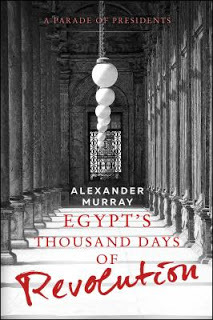
Since his first visit to Egypt in 1981, Alexander Murray has been spending a lot of time in the country. He was there when Sadat was publicly gunned down; he witnessed the demonstrations in Tahrir Square, the election and arrest of President Mursi and the rise and rise of General - now President - Sisi. Throughout this time he has taken daily photographs and kept a journal recording the lives of ordinary Egyptians trying to live and work through these turbulent events. The book reveals intense beauty and extreme poverty. If you want an insight into what it is like to live in a country torn apart by political and religious extremes, then this is a must-read. It’s written as extracts from Alexander’s journal accompanied by lots of photographs, so it’s also an easy read.
Recent events, including the bombing of a Russian passenger jet from Sharm al Sheikh, make this a very contemporary book. My own time spent in the Middle East made it of particular interest to me. I worked in English broadcasting under tight censorship, so the criminalisation of journalists trying to report the truth came as no surprise. Truth is the first casualty of conflict. Alexander Murray risks his own freedom of movement in this account of what it feels like to walk the streets of Cairo and Alexandria under a series of repressive regimes. It's a brave book. I asked Alexander about the process of writing it.
Q. 1. What is it about Egypt that you love so much?
It's a place of miracles - the great Nile bringing its life-giving force to a desert land, the vision behind the creation of the temples and pyramids, the indomitability of its inhabitants under all kinds of oppression - whether it be the sun or political regimes of different colours throughout the millennia. It's also the place that first inspired me to travel as a young man and experience, for myself, things that seemed so impossibly out of reach when I was a teenager. I became a man in getting there and being there - you don't forget such things.
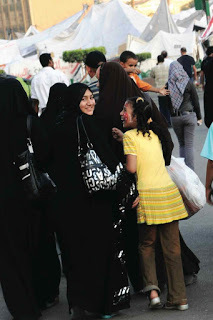 Tahrir Square, Cairo
Tahrir Square, Cairo
Q.2. What gave you the idea of writing a book about your Egyptian experiences?
I've always kept a journal when I've travelled and it was no different when chance or synchronicity took me back to Cairo regularly, starting not long after the 25th January 2011 revolution. A good friend commented that my writing seemed to 'catch fire' when I was there and this coupled with the fact that my visits coincided with nearly all the pivotal moments in the country's recent history plus the fact that I had taken street-level photographs every day made me think that there was something unique and worth sharing.
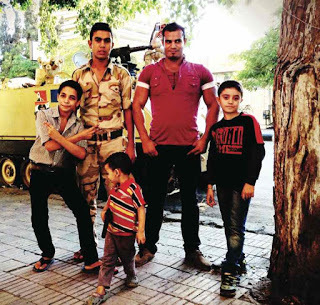
Q.3. Tell me about the process of turning your journals into a book.
It was more challenging than I thought! The raw material tends to flow easily in my experience; the preparation for publication bringing all aspects of the writer's craft to bear is harder . . . but essential! First of all, I wanted to check that the quality of the writing was of a professional and publishable standard so I worked with a literary editor to give me straight feedback on the manuscript. I have remained extremely faithful to the original entries but many needed polishing to ensure consistency of tone and clarity of meaning. The tooth-comb revision necessary to make the whole read smoothly was painstaking and time consuming but what joy when I could read whole passages without finding anything that jarred, like a word repeated too soon after its previous use.
I found my best editing environment was a bookshop-cafe around the block from where I live. The owner was delighted to know why I was spending so many hours at one of his tables (I bought a very credible amount of coffees and sandwiches to justify my presence!) and he introduced me to other published writers who gave me encouragement throughout, often stopping at my table and putting a hand on my shoulder.
As I followed the indie route, I also had to set myself up as a publisher under the local tax regime and then recruit a team of book designers, proof readers, photo editors and illustrators. I worked with them virtually using time differences to keep the production preparation rolling. One of the biggest challenges was to pick up my energy when sometimes things went into a lull. I set myself deadlines and the most useful thing of all that I did was to declare to all my friends and colleagues that I was going to publish a book. Having gone public there was no way I was going to fail!
Q.4. Given the political situation in Egypt and the imprisoning of journalists and bloggers throughout the Middle East at the moment, did you feel that you were taking a big risk to publish this book now?
Yes. I was bolder than those around me, including my wife, but I still had cold-sweat, middle-of-the-night wake up moments. I'll always remember the night I sat on the edge of my bed in pitch darkness in Cairo listening to the 3 am call to prayer coming through our open bedroom window and wondering what the hell I was doing. I resolved to do a final run through of the manuscript to check for words that were gratuitously harsh or overly assertive that perhaps would unnecessarily provoke the authorities. I spent the rest of the night lying awake in bed revising the text as if on a screen in my mind. When light came I went straight to my local Cairo cafe and made the required amendments, careful to keep the thrust of the message intact. It was clear that the push of a publication button could change not just my life but those of my nearest and dearest, and the fairness of that weighed heavily on me. On the other hand, during the church service we attended in Scotland to celebrate our 25th wedding anniversary, one of the readings called for all of us to courageously speak up against oppression. At that moment, I knew the only route possible was publication.
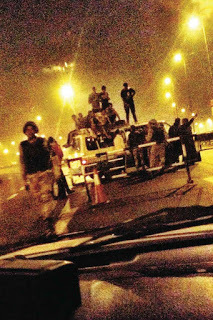 Curfew - road-block
Curfew - road-block
Q.5. Why did you decide to ‘Indie’ publish in the end? This is, after all, a very commercial book.
It was all about topicality of the subject and the foreseen long lead-times through a traditional publisher which, through consultation, seemed to be up to two years. I wanted to strike while the iron was hot. I must also say that the degree of self-direction and sense of hands-on creation of the indie route was very satisfying and empowering.
Q.6. When did you first know that you wanted to be a writer?
Goodness, I can't remember if there was a moment as such but looking back I can trace an underlying, undeniable and on-going motivation. I still have a school jotter containing compositions I wrote when I was nine. I clearly remember writing one of them which involved the hero sacrificing himself to save a drowning child from a stormy sea. The teacher gave it good marks but was concerned about the subject matter which disappointed me a little! I won the Reid Prize for English in sixth year, due in large part to the creative writing component, and remember long days writing or composing stories in my head as I walked to work in my twenties. And then when I was forty-seven, on top of a very busy full time role as a director of a multinational company, I signed up for an Open University creative writing course that required twenty plus hours of writing per week for nine months. As Maslow wrote, 'what a man can be, he must be' and that seems to be the nature of my relationship with writing. I just wish I had self-directed myself or been encouraged more strongly by others to pursue writing as the main focus of my professional life a lot earlier, before spending five years studying law, for example!
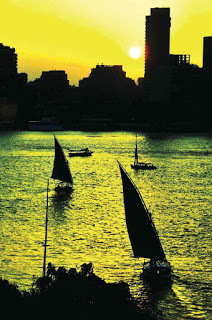 Nile sunset
Nile sunset
Q.7. What kind of books do you like reading?
I love books of poetic prose - Laurie Lee is an early inspiration especially his tales of adventure and self discovery. I also love writers who paint landscapes as if before a canvas, which vividly evoke an era I can never know, like John Fowles in the opening of Daniel Martin. Books that pivot on the subtlest expression of the deepest of emotions like those by Kazuo Isiguro and Imre Kertézs. Finally, I love books that sweep through generations highlighting endurance, fortitude and unquenchable spirit. In short, books that touch, inspire and show a way forward. I'm all about adventure, freedom and possibilities and maybe it's not surprising that my reading choices revolve around these themes.
Egypt's Thousand Days of Revolution: A Parade of Presidents
by Alexander Murray
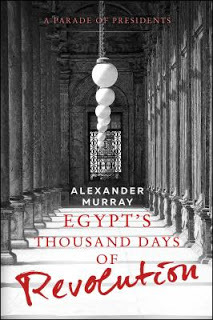 "Not a traditional guide, not a history, but something more pleasing: a journal which reminded me of the style of Stevenson's Travels with a Donkey in its keen observation, its search for understanding, and in the sense that part of the charm is in getting to know the author with all his humour and humanity. When I finished the book I felt as if I'd been there with him, and shared his hopes for the future of a country which could be hugely important in Africa and in the Middle East..." Amazon Review
"Not a traditional guide, not a history, but something more pleasing: a journal which reminded me of the style of Stevenson's Travels with a Donkey in its keen observation, its search for understanding, and in the sense that part of the charm is in getting to know the author with all his humour and humanity. When I finished the book I felt as if I'd been there with him, and shared his hopes for the future of a country which could be hugely important in Africa and in the Middle East..." Amazon Review
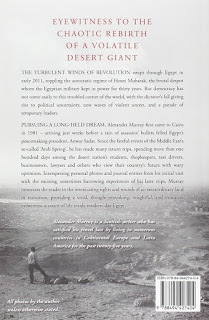 Some Reviews:-
Some Reviews:-
"It's a heartbreaking tale, because we hear the stories from the local people Alexander constantly talks to, who are poor, oppressed and frightened, but still hopeful of a decent and fair government."
"Part travelogue, part journalistic endeavour, this should be on the shelf of anyone who wants to understand more about modern-day Egypt and Egyptians. The characters and the stories within these pages stay with you long after you've reluctantly closed the back cover."
January 25th is the anniversary of the Egyptian Revolution during the ‘Arab Spring’ of 2011, so it seems the perfect day to blog about a book telling the inside story of a sequence of revolutions and a ‘Parade of Presidents’.

Since his first visit to Egypt in 1981, Alexander Murray has been spending a lot of time in the country. He was there when Sadat was publicly gunned down; he witnessed the demonstrations in Tahrir Square, the election and arrest of President Mursi and the rise and rise of General - now President - Sisi. Throughout this time he has taken daily photographs and kept a journal recording the lives of ordinary Egyptians trying to live and work through these turbulent events. The book reveals intense beauty and extreme poverty. If you want an insight into what it is like to live in a country torn apart by political and religious extremes, then this is a must-read. It’s written as extracts from Alexander’s journal accompanied by lots of photographs, so it’s also an easy read.
Recent events, including the bombing of a Russian passenger jet from Sharm al Sheikh, make this a very contemporary book. My own time spent in the Middle East made it of particular interest to me. I worked in English broadcasting under tight censorship, so the criminalisation of journalists trying to report the truth came as no surprise. Truth is the first casualty of conflict. Alexander Murray risks his own freedom of movement in this account of what it feels like to walk the streets of Cairo and Alexandria under a series of repressive regimes. It's a brave book. I asked Alexander about the process of writing it.
Q. 1. What is it about Egypt that you love so much?
It's a place of miracles - the great Nile bringing its life-giving force to a desert land, the vision behind the creation of the temples and pyramids, the indomitability of its inhabitants under all kinds of oppression - whether it be the sun or political regimes of different colours throughout the millennia. It's also the place that first inspired me to travel as a young man and experience, for myself, things that seemed so impossibly out of reach when I was a teenager. I became a man in getting there and being there - you don't forget such things.
 Tahrir Square, Cairo
Tahrir Square, CairoQ.2. What gave you the idea of writing a book about your Egyptian experiences?
I've always kept a journal when I've travelled and it was no different when chance or synchronicity took me back to Cairo regularly, starting not long after the 25th January 2011 revolution. A good friend commented that my writing seemed to 'catch fire' when I was there and this coupled with the fact that my visits coincided with nearly all the pivotal moments in the country's recent history plus the fact that I had taken street-level photographs every day made me think that there was something unique and worth sharing.

Q.3. Tell me about the process of turning your journals into a book.
It was more challenging than I thought! The raw material tends to flow easily in my experience; the preparation for publication bringing all aspects of the writer's craft to bear is harder . . . but essential! First of all, I wanted to check that the quality of the writing was of a professional and publishable standard so I worked with a literary editor to give me straight feedback on the manuscript. I have remained extremely faithful to the original entries but many needed polishing to ensure consistency of tone and clarity of meaning. The tooth-comb revision necessary to make the whole read smoothly was painstaking and time consuming but what joy when I could read whole passages without finding anything that jarred, like a word repeated too soon after its previous use.
I found my best editing environment was a bookshop-cafe around the block from where I live. The owner was delighted to know why I was spending so many hours at one of his tables (I bought a very credible amount of coffees and sandwiches to justify my presence!) and he introduced me to other published writers who gave me encouragement throughout, often stopping at my table and putting a hand on my shoulder.
As I followed the indie route, I also had to set myself up as a publisher under the local tax regime and then recruit a team of book designers, proof readers, photo editors and illustrators. I worked with them virtually using time differences to keep the production preparation rolling. One of the biggest challenges was to pick up my energy when sometimes things went into a lull. I set myself deadlines and the most useful thing of all that I did was to declare to all my friends and colleagues that I was going to publish a book. Having gone public there was no way I was going to fail!
Q.4. Given the political situation in Egypt and the imprisoning of journalists and bloggers throughout the Middle East at the moment, did you feel that you were taking a big risk to publish this book now?
Yes. I was bolder than those around me, including my wife, but I still had cold-sweat, middle-of-the-night wake up moments. I'll always remember the night I sat on the edge of my bed in pitch darkness in Cairo listening to the 3 am call to prayer coming through our open bedroom window and wondering what the hell I was doing. I resolved to do a final run through of the manuscript to check for words that were gratuitously harsh or overly assertive that perhaps would unnecessarily provoke the authorities. I spent the rest of the night lying awake in bed revising the text as if on a screen in my mind. When light came I went straight to my local Cairo cafe and made the required amendments, careful to keep the thrust of the message intact. It was clear that the push of a publication button could change not just my life but those of my nearest and dearest, and the fairness of that weighed heavily on me. On the other hand, during the church service we attended in Scotland to celebrate our 25th wedding anniversary, one of the readings called for all of us to courageously speak up against oppression. At that moment, I knew the only route possible was publication.
 Curfew - road-block
Curfew - road-blockQ.5. Why did you decide to ‘Indie’ publish in the end? This is, after all, a very commercial book.
It was all about topicality of the subject and the foreseen long lead-times through a traditional publisher which, through consultation, seemed to be up to two years. I wanted to strike while the iron was hot. I must also say that the degree of self-direction and sense of hands-on creation of the indie route was very satisfying and empowering.
Q.6. When did you first know that you wanted to be a writer?
Goodness, I can't remember if there was a moment as such but looking back I can trace an underlying, undeniable and on-going motivation. I still have a school jotter containing compositions I wrote when I was nine. I clearly remember writing one of them which involved the hero sacrificing himself to save a drowning child from a stormy sea. The teacher gave it good marks but was concerned about the subject matter which disappointed me a little! I won the Reid Prize for English in sixth year, due in large part to the creative writing component, and remember long days writing or composing stories in my head as I walked to work in my twenties. And then when I was forty-seven, on top of a very busy full time role as a director of a multinational company, I signed up for an Open University creative writing course that required twenty plus hours of writing per week for nine months. As Maslow wrote, 'what a man can be, he must be' and that seems to be the nature of my relationship with writing. I just wish I had self-directed myself or been encouraged more strongly by others to pursue writing as the main focus of my professional life a lot earlier, before spending five years studying law, for example!
 Nile sunset
Nile sunsetQ.7. What kind of books do you like reading?
I love books of poetic prose - Laurie Lee is an early inspiration especially his tales of adventure and self discovery. I also love writers who paint landscapes as if before a canvas, which vividly evoke an era I can never know, like John Fowles in the opening of Daniel Martin. Books that pivot on the subtlest expression of the deepest of emotions like those by Kazuo Isiguro and Imre Kertézs. Finally, I love books that sweep through generations highlighting endurance, fortitude and unquenchable spirit. In short, books that touch, inspire and show a way forward. I'm all about adventure, freedom and possibilities and maybe it's not surprising that my reading choices revolve around these themes.
Egypt's Thousand Days of Revolution: A Parade of Presidents
by Alexander Murray
 "Not a traditional guide, not a history, but something more pleasing: a journal which reminded me of the style of Stevenson's Travels with a Donkey in its keen observation, its search for understanding, and in the sense that part of the charm is in getting to know the author with all his humour and humanity. When I finished the book I felt as if I'd been there with him, and shared his hopes for the future of a country which could be hugely important in Africa and in the Middle East..." Amazon Review
"Not a traditional guide, not a history, but something more pleasing: a journal which reminded me of the style of Stevenson's Travels with a Donkey in its keen observation, its search for understanding, and in the sense that part of the charm is in getting to know the author with all his humour and humanity. When I finished the book I felt as if I'd been there with him, and shared his hopes for the future of a country which could be hugely important in Africa and in the Middle East..." Amazon Review Some Reviews:-
Some Reviews:-"It's a heartbreaking tale, because we hear the stories from the local people Alexander constantly talks to, who are poor, oppressed and frightened, but still hopeful of a decent and fair government."
"Part travelogue, part journalistic endeavour, this should be on the shelf of anyone who wants to understand more about modern-day Egypt and Egyptians. The characters and the stories within these pages stay with you long after you've reluctantly closed the back cover."
Published on January 23, 2016 15:30
January 17, 2016
The Monthly Project
I often go for a walk up the river, but my attention is usually on work related things. Walking is good for writing, or incubating, and my head is full of stories and words - anything but the landscape I'm walking through. If your mind is elsewhere, then you don't notice the things around you. So, in November I had the idea of going for a walk on the same day every month, at the same time of day and taking photographs from the same, favourite, spot - really looking at the landscape around me as it changes with the seasons.
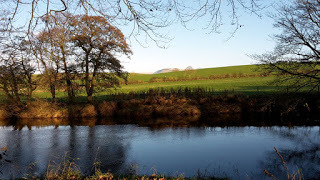
I chose a place I love - a small copse of trees on the bank of the River Eden, where you get a good view of the fells and the farmland across the river. It was late afternoon, with the sun low, illuminating the fields and the distant white-capped hills.
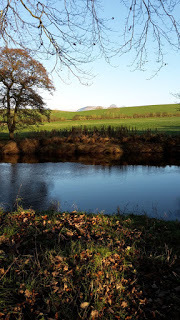
In November it was lush green and the sun had a deep autumn tint to it. The trees still had some foliage clinging to the branches. There were little clumps of ice, like crystals, concealed in the fallen leaves.
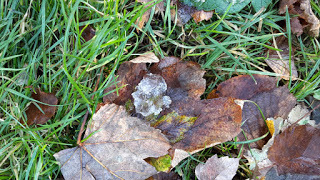
December didn't happen - the river was still too much in flood and covering the land. Walking up the river bank just wasn't possible. A month later, in January, I was intrigued to see what damage the floods had done. There were big sections of the river bank washed out and lines of trees lying in the water waiting for the next flood to drift them down to the sea. But the little copse of trees was unchanged.
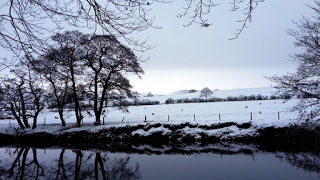
Except for the snow covering everything and the eerie light. It's dark here by four thirty, so at 3.45pm the light is beginning to fade. Without the snow to reflect the sky, it would have been a very gloomy photograph.
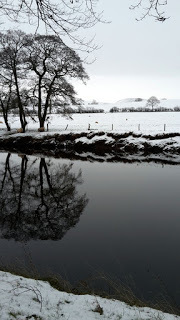
Sheep were scrabbling in the snow to find grass to nibble and there was a raptor calling further up the river - we've had a peregrine around for a few days now. But otherwise very little was stirring. Evidence of the flood was everywhere - I loved the way it had woven tapestries on the fences with grass, leaves and twigs.
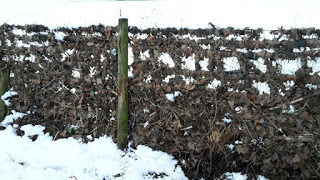
I don't know where this project is going, but it's certainly making me really look at things rather than just wander in an absent minded way. It was one of the great French authors who said that a writer should observe passionately - 'Look at a tree,' he commanded, 'until it looks like no other tree you have ever seen.' So I'm looking.

I chose a place I love - a small copse of trees on the bank of the River Eden, where you get a good view of the fells and the farmland across the river. It was late afternoon, with the sun low, illuminating the fields and the distant white-capped hills.

In November it was lush green and the sun had a deep autumn tint to it. The trees still had some foliage clinging to the branches. There were little clumps of ice, like crystals, concealed in the fallen leaves.

December didn't happen - the river was still too much in flood and covering the land. Walking up the river bank just wasn't possible. A month later, in January, I was intrigued to see what damage the floods had done. There were big sections of the river bank washed out and lines of trees lying in the water waiting for the next flood to drift them down to the sea. But the little copse of trees was unchanged.

Except for the snow covering everything and the eerie light. It's dark here by four thirty, so at 3.45pm the light is beginning to fade. Without the snow to reflect the sky, it would have been a very gloomy photograph.

Sheep were scrabbling in the snow to find grass to nibble and there was a raptor calling further up the river - we've had a peregrine around for a few days now. But otherwise very little was stirring. Evidence of the flood was everywhere - I loved the way it had woven tapestries on the fences with grass, leaves and twigs.

I don't know where this project is going, but it's certainly making me really look at things rather than just wander in an absent minded way. It was one of the great French authors who said that a writer should observe passionately - 'Look at a tree,' he commanded, 'until it looks like no other tree you have ever seen.' So I'm looking.
Published on January 17, 2016 10:36
January 13, 2016
Silencing an Inconvenient Truth
So you think it isn’t dangerous to be a writer?
Writing seems such a harmless occupation, but if you start looking at international affairs, you begin to realise just how powerful the written word is. I have recently edited a book on the political situation in Egypt, written under a pseudonym, with the proviso that my name did not appear anywhere in relation to the book. Given the way that Egypt has recently been treating journalists, it seemed a wise precaution.
The case of disappearing publishers in Hong Kong has recently focused public attention on the dangers of writing and publishing material that those in power don’t like. Lee Bo and his four associates published books that were legal in Hong Kong, but not in China, yet they were ‘spirited away’ across the border in a sinister scenario worthy of a Bond movie. So, what kind of firebrand publishing business was this? According to a HK bookseller, their books ‘focus on taboo topics: politics, religion and sex.’
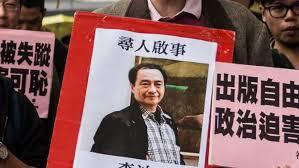 Lee BoIn many, many countries across the world, freedom of information and opinion is restricted on these three absolutely fundamental subjects. When I worked in broadcasting in Qatar, these three subjects could not be mentioned and a Ministry of Information censor sat in the corner of the studio ready to pull the plug. Even in the supposedly liberal west, the idea that we have complete freedom in these areas is an illusion, as the arrest of Edward Snowden and others has recently illustrated. If you reveal your government’s duplicity and seek to tell an unwelcome truth, you are regarded as a national traitor and liable to be incarcerated for a very long time. In the USA you can be murdered for supporting Planned Parenthood. All over the world you can be murdered for being the wrong kind of Christian or the wrong kind of Muslim. In Saudi Arabia don’t even mention either the D word (democracy) or Women’s Rights. Critics of Islam have been gunned down in European capital cities, most notably the Charlie Hebdo journalists in Paris. What you write can seriously affect your health.
Lee BoIn many, many countries across the world, freedom of information and opinion is restricted on these three absolutely fundamental subjects. When I worked in broadcasting in Qatar, these three subjects could not be mentioned and a Ministry of Information censor sat in the corner of the studio ready to pull the plug. Even in the supposedly liberal west, the idea that we have complete freedom in these areas is an illusion, as the arrest of Edward Snowden and others has recently illustrated. If you reveal your government’s duplicity and seek to tell an unwelcome truth, you are regarded as a national traitor and liable to be incarcerated for a very long time. In the USA you can be murdered for supporting Planned Parenthood. All over the world you can be murdered for being the wrong kind of Christian or the wrong kind of Muslim. In Saudi Arabia don’t even mention either the D word (democracy) or Women’s Rights. Critics of Islam have been gunned down in European capital cities, most notably the Charlie Hebdo journalists in Paris. What you write can seriously affect your health.
Palestinian journalist Mohamed al-Qeq is reported to be near death, after a hunger strike protesting against his detention in an Israeli jail without charge for six months. What he was writing was deemed by Israel to support Hamas.
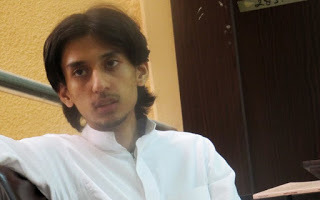 Hamza KashgariThe Middle East is one of the most risky areas for a writer, and the case of 23 year old poet and
newspaper columnist Hamza Kashgari
is particularly sinister. In 2012 he posted a number of Tweets that could be construed as critical of the prophet Mohammed and supportive of women’s rights. The authorities called for his arrest on charges of ‘apostasy’ which carries the death penalty. Hamza left to seek political asylum in New Zealand, but, despite an injunction against his extradition (Malaysia has no extradition treaty with Saudi Arabia), he was intercepted in the transit lounge of Kuala Lumpur international airport, arrested and put on a private plane to Saudia Arabia. He spent two years in jail without trial before an international campaign secured his release. Hamza wrote that;
Hamza KashgariThe Middle East is one of the most risky areas for a writer, and the case of 23 year old poet and
newspaper columnist Hamza Kashgari
is particularly sinister. In 2012 he posted a number of Tweets that could be construed as critical of the prophet Mohammed and supportive of women’s rights. The authorities called for his arrest on charges of ‘apostasy’ which carries the death penalty. Hamza left to seek political asylum in New Zealand, but, despite an injunction against his extradition (Malaysia has no extradition treaty with Saudi Arabia), he was intercepted in the transit lounge of Kuala Lumpur international airport, arrested and put on a private plane to Saudia Arabia. He spent two years in jail without trial before an international campaign secured his release. Hamza wrote that;
"I view my actions as part of a process toward freedom. I was demanding my right to practice the most basic human rights—freedom of expression and thought—so nothing was done in vain. I believe I'm just a scapegoat for a larger conflict. There are a lot of people like me in Saudi Arabia who are fighting for their rights." In his Tweets, he commented on women’s rights by stating that Saudi women "won't go to hell 'because it's impossible to go there twice." He was forced to issue a public apology and has been silent since then.
Saudi blogger Raif Badawi, also arrested in 2012, was sentenced to 1000 lashes and ten years in prison. Where he remains, in poor health after receiving the first round of lashes, despite being granted political asylum in Canada. He, too, has been effectively silenced.
In the 21st century, with a global internet network, shouldn’t we be moving towards a more liberal information culture? Sadly, it seems not. There is a growing culture of fear in the world of publishing. Only the brave, the committed and - possibly the old with nothing left to lose - are willing to risk their lives to tell an inconvenient truth.
Writing seems such a harmless occupation, but if you start looking at international affairs, you begin to realise just how powerful the written word is. I have recently edited a book on the political situation in Egypt, written under a pseudonym, with the proviso that my name did not appear anywhere in relation to the book. Given the way that Egypt has recently been treating journalists, it seemed a wise precaution.
The case of disappearing publishers in Hong Kong has recently focused public attention on the dangers of writing and publishing material that those in power don’t like. Lee Bo and his four associates published books that were legal in Hong Kong, but not in China, yet they were ‘spirited away’ across the border in a sinister scenario worthy of a Bond movie. So, what kind of firebrand publishing business was this? According to a HK bookseller, their books ‘focus on taboo topics: politics, religion and sex.’
 Lee BoIn many, many countries across the world, freedom of information and opinion is restricted on these three absolutely fundamental subjects. When I worked in broadcasting in Qatar, these three subjects could not be mentioned and a Ministry of Information censor sat in the corner of the studio ready to pull the plug. Even in the supposedly liberal west, the idea that we have complete freedom in these areas is an illusion, as the arrest of Edward Snowden and others has recently illustrated. If you reveal your government’s duplicity and seek to tell an unwelcome truth, you are regarded as a national traitor and liable to be incarcerated for a very long time. In the USA you can be murdered for supporting Planned Parenthood. All over the world you can be murdered for being the wrong kind of Christian or the wrong kind of Muslim. In Saudi Arabia don’t even mention either the D word (democracy) or Women’s Rights. Critics of Islam have been gunned down in European capital cities, most notably the Charlie Hebdo journalists in Paris. What you write can seriously affect your health.
Lee BoIn many, many countries across the world, freedom of information and opinion is restricted on these three absolutely fundamental subjects. When I worked in broadcasting in Qatar, these three subjects could not be mentioned and a Ministry of Information censor sat in the corner of the studio ready to pull the plug. Even in the supposedly liberal west, the idea that we have complete freedom in these areas is an illusion, as the arrest of Edward Snowden and others has recently illustrated. If you reveal your government’s duplicity and seek to tell an unwelcome truth, you are regarded as a national traitor and liable to be incarcerated for a very long time. In the USA you can be murdered for supporting Planned Parenthood. All over the world you can be murdered for being the wrong kind of Christian or the wrong kind of Muslim. In Saudi Arabia don’t even mention either the D word (democracy) or Women’s Rights. Critics of Islam have been gunned down in European capital cities, most notably the Charlie Hebdo journalists in Paris. What you write can seriously affect your health.Palestinian journalist Mohamed al-Qeq is reported to be near death, after a hunger strike protesting against his detention in an Israeli jail without charge for six months. What he was writing was deemed by Israel to support Hamas.
 Hamza KashgariThe Middle East is one of the most risky areas for a writer, and the case of 23 year old poet and
newspaper columnist Hamza Kashgari
is particularly sinister. In 2012 he posted a number of Tweets that could be construed as critical of the prophet Mohammed and supportive of women’s rights. The authorities called for his arrest on charges of ‘apostasy’ which carries the death penalty. Hamza left to seek political asylum in New Zealand, but, despite an injunction against his extradition (Malaysia has no extradition treaty with Saudi Arabia), he was intercepted in the transit lounge of Kuala Lumpur international airport, arrested and put on a private plane to Saudia Arabia. He spent two years in jail without trial before an international campaign secured his release. Hamza wrote that;
Hamza KashgariThe Middle East is one of the most risky areas for a writer, and the case of 23 year old poet and
newspaper columnist Hamza Kashgari
is particularly sinister. In 2012 he posted a number of Tweets that could be construed as critical of the prophet Mohammed and supportive of women’s rights. The authorities called for his arrest on charges of ‘apostasy’ which carries the death penalty. Hamza left to seek political asylum in New Zealand, but, despite an injunction against his extradition (Malaysia has no extradition treaty with Saudi Arabia), he was intercepted in the transit lounge of Kuala Lumpur international airport, arrested and put on a private plane to Saudia Arabia. He spent two years in jail without trial before an international campaign secured his release. Hamza wrote that;"I view my actions as part of a process toward freedom. I was demanding my right to practice the most basic human rights—freedom of expression and thought—so nothing was done in vain. I believe I'm just a scapegoat for a larger conflict. There are a lot of people like me in Saudi Arabia who are fighting for their rights." In his Tweets, he commented on women’s rights by stating that Saudi women "won't go to hell 'because it's impossible to go there twice." He was forced to issue a public apology and has been silent since then.
Saudi blogger Raif Badawi, also arrested in 2012, was sentenced to 1000 lashes and ten years in prison. Where he remains, in poor health after receiving the first round of lashes, despite being granted political asylum in Canada. He, too, has been effectively silenced.
In the 21st century, with a global internet network, shouldn’t we be moving towards a more liberal information culture? Sadly, it seems not. There is a growing culture of fear in the world of publishing. Only the brave, the committed and - possibly the old with nothing left to lose - are willing to risk their lives to tell an inconvenient truth.
Published on January 13, 2016 06:48
January 11, 2016
Monday Music - David Bowie: Let's Dance
"Put on your red shoes and dance the blues", has long been my mantra. What else can you do when things get tough. Like many people in the world today, I'm saddened by David Bowie's death. Love him or hate him, there can't be many musicians who have been a rock icon for my generation, then my children's, then my grandchildren's. RIP David Bowie. Let's Dance.
Published on January 11, 2016 09:01
January 5, 2016
Tuesday Poem: My Doubt by Jane Hirshfield
I wake, doubt, beside you,
like a curtain half-open.
I dress doubting,
like a cup
undecided if it has been dropped.
I eat doubting,
work doubting,
go out to a dubious cafe with skeptical friends.
I go to sleep doubting myself,
as a herd of goats
sleep in a suddenly gone-quiet truck.
I dream you, doubt,
nightly—
for what is the meaning of dreaming
if not that all we are while inside it
is transient, amorphous, in question?
Left hand and right hand,
doubt, you are in me,
throwing a basketball, guiding my knife and my fork.
Left knee and right knee,
we run for a bus,
for a meeting that surely will end before we arrive.
I would like
to grow content in you, doubt,
as a double-hung window
settles obedient into its hidden pulleys and ropes.
I doubt I can do so:
your own counterweight governs my nights and my days.
As the knob of hung lead holds steady
the open mouth of a window,
you hold me,
my kneeling before you resistant, stubborn,
offering these furious praises
I can’t help but doubt you will ever be able to hear.
Jane Hirshfield
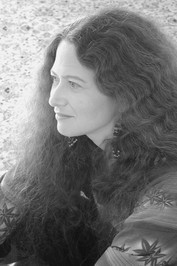
Copyright © 2016 by Jane Hirshfield. Originally published in Poem-a-Day on January 4, 2016, by the Academy of American Poets.
To hear the poet reading the original and for more information please click over to the Academy of American Poets.
Jane Hirshfield is a very interesting poet and I'm currently reading her book of essays about poetry Ten Windows: How Great Poems Transform the World (Alfred A. Knopf, 2015) and finding it fascinating. I love some of her comments on poetry; 'transformation is not the sole means of poetic imagination', there are also 'the muscles and hinged joints of story, the sinew of abstract statement, the footfall of a single, awakening image'. . . . A good poem should be never purely description, but 'a portrait of a state of being, of soul'. And the last two lines should be 'the richest treasure', offering vision and illumination. Ten Windows is currently difficult to get through the usual outlets, but second hand bookstores such as Abe Books in the UK or Thrift Books in the US can supply it very quickly and cheaply.
like a curtain half-open.
I dress doubting,
like a cup
undecided if it has been dropped.
I eat doubting,
work doubting,
go out to a dubious cafe with skeptical friends.
I go to sleep doubting myself,
as a herd of goats
sleep in a suddenly gone-quiet truck.
I dream you, doubt,
nightly—
for what is the meaning of dreaming
if not that all we are while inside it
is transient, amorphous, in question?
Left hand and right hand,
doubt, you are in me,
throwing a basketball, guiding my knife and my fork.
Left knee and right knee,
we run for a bus,
for a meeting that surely will end before we arrive.
I would like
to grow content in you, doubt,
as a double-hung window
settles obedient into its hidden pulleys and ropes.
I doubt I can do so:
your own counterweight governs my nights and my days.
As the knob of hung lead holds steady
the open mouth of a window,
you hold me,
my kneeling before you resistant, stubborn,
offering these furious praises
I can’t help but doubt you will ever be able to hear.
Jane Hirshfield

Copyright © 2016 by Jane Hirshfield. Originally published in Poem-a-Day on January 4, 2016, by the Academy of American Poets.
To hear the poet reading the original and for more information please click over to the Academy of American Poets.
Jane Hirshfield is a very interesting poet and I'm currently reading her book of essays about poetry Ten Windows: How Great Poems Transform the World (Alfred A. Knopf, 2015) and finding it fascinating. I love some of her comments on poetry; 'transformation is not the sole means of poetic imagination', there are also 'the muscles and hinged joints of story, the sinew of abstract statement, the footfall of a single, awakening image'. . . . A good poem should be never purely description, but 'a portrait of a state of being, of soul'. And the last two lines should be 'the richest treasure', offering vision and illumination. Ten Windows is currently difficult to get through the usual outlets, but second hand bookstores such as Abe Books in the UK or Thrift Books in the US can supply it very quickly and cheaply.
Published on January 05, 2016 09:07
January 1, 2016
Hello 2016! Looking Forwards: Counting Back.
It's New Year's Day and I've managed to crawl up to the computer to post a few words. A combination of post-flood stress and a horrid coughing bug (thank you Santa!) have laid me out for a week, wiping out any festivities, but I'm beginning to surface and count blessings.
2015 was a very mixed year with lots of highs and lows. Going to Haida Gwaii was one of the most memorable experiences - some of the wildest beaches on the planet. This is Balance Rock at Skidegate.
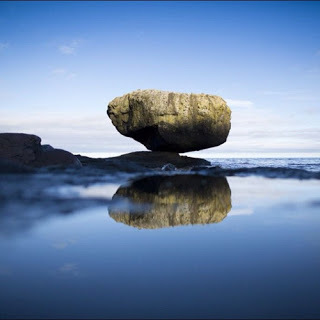
And there was a feast of Haida Art, including this Bill Reid sculpture of Raven discovering the first humans hiding in a clam shell.
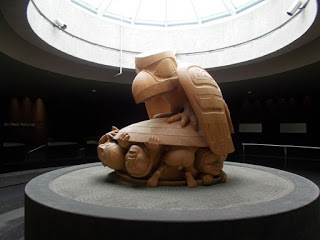
It's been a good year to be a writer too. Being part of the ' Women Writing Women ' Box Set was a big high, with wonderful fellow authors Orna Ross , Jessica Bell , Jane Davis , Joni Rodgers , Carol Cooper and Roz Morris .
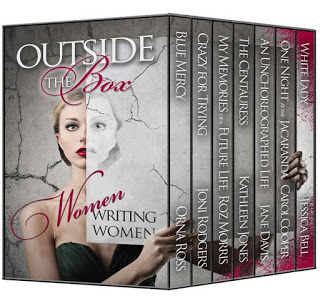 We were a formidable bunch, especially when we got together at the London Book Fair, sadly minus Joni Rodgers who was across the Atlantic in the USA and Jessica Bell who couldn't tear herself away from Athens! L to R Kathleen, Roz, Carol, Jane and Orna.
We were a formidable bunch, especially when we got together at the London Book Fair, sadly minus Joni Rodgers who was across the Atlantic in the USA and Jessica Bell who couldn't tear herself away from Athens! L to R Kathleen, Roz, Carol, Jane and Orna.
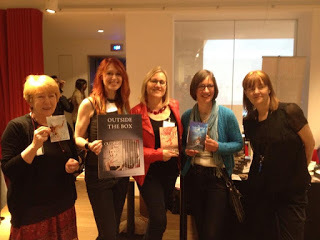
Other wonderful moments have involved spending time with the youngest members of the family.
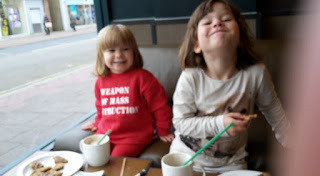
But there have also been quite a few lows, some of them involving the economic and political instability of our planet at the moment and the humanitarian crisis in the Middle East. Personal lows featured water - too much of it. This is the ground floor of our home disappearing beneath December's flood water - and not for the first time. We flooded on Christmas Eve too.
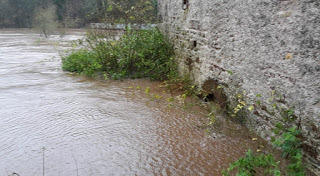
The end result looked like this. Total wreckage filled a large skip, which is still sitting outside in a sea of mud. We are rather shell-shocked and don't know quite how the coming year is going to work out.
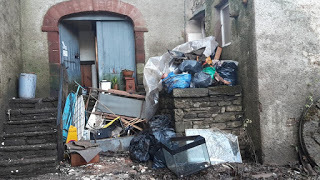
I've been doing a lot of writing in 2015, so not as much reading. Favourite books included Naomi Klein's 'This Changes Everything' - a very scary look at climate change and its relationship with our economic system. Novels I loved included Niall Williams 'History of the Rain' (how was I to know the title would be ominous!), and Jane Davis' 'An Unknown Woman' . I didn't know just how close the latter would come to personal reality. Natural disasters like fire and flood make you think hard about what you most value. It's easier than you think for a normally sane and secure person to unravel.
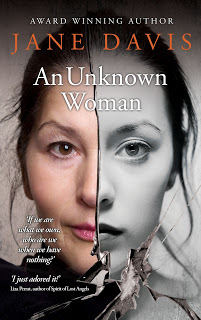
In the field of memoir, Jay Desind's 'Lost in Language' - a gay man's search for love in a foreign country - was very moving, particularly as Jay had experienced a 'significant moment' when he found one of my poems on the internet. As a writer you simply don't know how your words are going to touch other people's lives when they go out into the world.
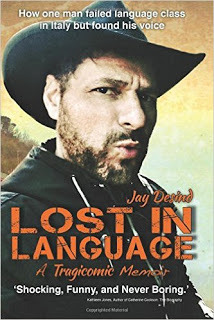 My favourite thriller was a lighthearted but expertly plotted novel about the murder of an author at a literature festival. '
Fest' by Mark McCrum
was surgically accurate about festivals, organisers and authors. Despite the author's reputation and high profile, this novel is an indie publication. More evidence of the madness of corporate publishing.
My favourite thriller was a lighthearted but expertly plotted novel about the murder of an author at a literature festival. '
Fest' by Mark McCrum
was surgically accurate about festivals, organisers and authors. Despite the author's reputation and high profile, this novel is an indie publication. More evidence of the madness of corporate publishing.
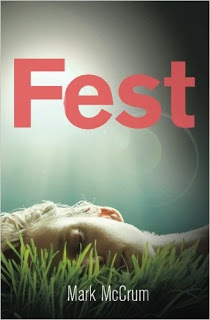
But it was a year for short stories and poetry - a rich horde of publications. Kim Moore's 'The Art of Falling' has been winning well deserved awards, so too has Pascale Petit's 'Fauverie'. I love them both, but the poems I keep coming back to are in Margaret Atwood's collection 'Morning in the Burned House' - published years ago, but a recent discovery for me. I also really love J o Bell's collection 'Kith' for its direct, compassionate and inherently humorous voice. Like the poet herself.
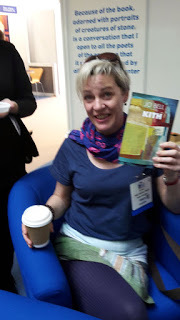
Short stories are also a genre much neglected by main-stream publishing. One of my favourite collections, 'The China Factory' , by Irish writer Mary Costello was published by the small Stinging Fly Press in Dublin. Avril Joy, winner of the prestigious Costa Award for short fiction, launched her collection, 'Millie and Bird', with the northern Iron Press this year. It's brilliant!
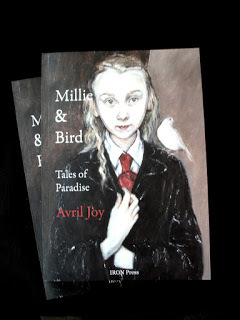
Here's to much more good writing in 2016 and an ardent hope for peace and prosperity for all people everywhere.
2015 was a very mixed year with lots of highs and lows. Going to Haida Gwaii was one of the most memorable experiences - some of the wildest beaches on the planet. This is Balance Rock at Skidegate.

And there was a feast of Haida Art, including this Bill Reid sculpture of Raven discovering the first humans hiding in a clam shell.

It's been a good year to be a writer too. Being part of the ' Women Writing Women ' Box Set was a big high, with wonderful fellow authors Orna Ross , Jessica Bell , Jane Davis , Joni Rodgers , Carol Cooper and Roz Morris .
 We were a formidable bunch, especially when we got together at the London Book Fair, sadly minus Joni Rodgers who was across the Atlantic in the USA and Jessica Bell who couldn't tear herself away from Athens! L to R Kathleen, Roz, Carol, Jane and Orna.
We were a formidable bunch, especially when we got together at the London Book Fair, sadly minus Joni Rodgers who was across the Atlantic in the USA and Jessica Bell who couldn't tear herself away from Athens! L to R Kathleen, Roz, Carol, Jane and Orna. 
Other wonderful moments have involved spending time with the youngest members of the family.

But there have also been quite a few lows, some of them involving the economic and political instability of our planet at the moment and the humanitarian crisis in the Middle East. Personal lows featured water - too much of it. This is the ground floor of our home disappearing beneath December's flood water - and not for the first time. We flooded on Christmas Eve too.

The end result looked like this. Total wreckage filled a large skip, which is still sitting outside in a sea of mud. We are rather shell-shocked and don't know quite how the coming year is going to work out.

I've been doing a lot of writing in 2015, so not as much reading. Favourite books included Naomi Klein's 'This Changes Everything' - a very scary look at climate change and its relationship with our economic system. Novels I loved included Niall Williams 'History of the Rain' (how was I to know the title would be ominous!), and Jane Davis' 'An Unknown Woman' . I didn't know just how close the latter would come to personal reality. Natural disasters like fire and flood make you think hard about what you most value. It's easier than you think for a normally sane and secure person to unravel.

In the field of memoir, Jay Desind's 'Lost in Language' - a gay man's search for love in a foreign country - was very moving, particularly as Jay had experienced a 'significant moment' when he found one of my poems on the internet. As a writer you simply don't know how your words are going to touch other people's lives when they go out into the world.
 My favourite thriller was a lighthearted but expertly plotted novel about the murder of an author at a literature festival. '
Fest' by Mark McCrum
was surgically accurate about festivals, organisers and authors. Despite the author's reputation and high profile, this novel is an indie publication. More evidence of the madness of corporate publishing.
My favourite thriller was a lighthearted but expertly plotted novel about the murder of an author at a literature festival. '
Fest' by Mark McCrum
was surgically accurate about festivals, organisers and authors. Despite the author's reputation and high profile, this novel is an indie publication. More evidence of the madness of corporate publishing.
But it was a year for short stories and poetry - a rich horde of publications. Kim Moore's 'The Art of Falling' has been winning well deserved awards, so too has Pascale Petit's 'Fauverie'. I love them both, but the poems I keep coming back to are in Margaret Atwood's collection 'Morning in the Burned House' - published years ago, but a recent discovery for me. I also really love J o Bell's collection 'Kith' for its direct, compassionate and inherently humorous voice. Like the poet herself.

Short stories are also a genre much neglected by main-stream publishing. One of my favourite collections, 'The China Factory' , by Irish writer Mary Costello was published by the small Stinging Fly Press in Dublin. Avril Joy, winner of the prestigious Costa Award for short fiction, launched her collection, 'Millie and Bird', with the northern Iron Press this year. It's brilliant!

Here's to much more good writing in 2016 and an ardent hope for peace and prosperity for all people everywhere.
Published on January 01, 2016 08:36
December 22, 2015
Tuesday Poem: 'Storm Warnings' - Adrienne Rich.
The glass has been falling all the afternoon,
And knowing better than the instrument
What winds are walking overhead, what zone
Of grey unrest is moving across the land,
I leave the book upon a pillowed chair
And walk from window to closed window, watching
Boughs strain against the sky
And think again, as often when the air
Moves inward toward a silent core of waiting,
How with a single purpose time has traveled
By secret currents of the undiscerned
Into this polar realm. Weather abroad
And weather in the heart alike come on
Regardless of prediction.
Between foreseeing and averting change
Lies all the mastery of elements
Which clocks and weatherglasses cannot alter.
Time in the hand is not control of time,
Nor shattered fragments of an instrument
A proof against the wind; the wind will rise,
We can only close the shutters.
I draw the curtains as the sky goes black
And set a match to candles sheathed in glass
Against the keyhole draught, the insistent whine
Of weather through the unsealed aperture.
This is our sole defense against the season;
These are the things we have learned to do
Who live in troubled regions.
Storm Warnings ©1951 by Adrienne Rich (1929-2012)
(from her first collection, A Change of World)
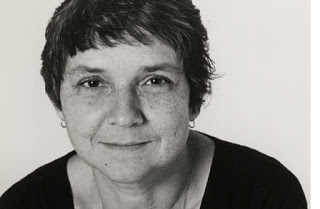
We are flooded again today - between 2 and 3 feet deep on the ground floor. But fortunately everything that could be wrecked or ruined has already been wrecked and ruined. A skip full of debris, sodden furniture, fridges and washing machines, destroyed in the flood two weeks ago, has disappeared underwater and odd items keep rising from the depths in a surreal fashion and floating off down the river. A fridge in full sail has to be seen to be believed. We have been warned that we may flood again on Christmas Eve when Evil Eva is due to lash us with her stormy tail. So this poem seemed quite suitable for both the Solstice and the flood.
Adrienne Rich is a profound and political poet who has had a major influence on my life - she was my first brush with feminism. Her work is amazingly consistent; from her first published poems (like Storm Warnings) to her later poetry, there is a recognisable voice and character. Some of her poems are among my all time favourites. Poems like Diving into the Wreck , What Kind of Times Are These? , Snapshots of a Daughter in Law, White Night, but particularly the long poem North American Time . Stanzas from this are burned into my memory.
II
Everything we write
will be used against us
or against those we love.
These are the terms,
take them or leave them.
Poetry never stood a chance
of standing outside history. . .
III
Try sitting at a typewriter
one calm summer evening
at a table by a window
in the country, try pretending
your time does not exist
that you are simply you
that the imagination simply strays
like a great moth, unintentional
try telling yourself
you are not accountable
to the life of your tribe
the breath of your planet.
IV
It doesn't matter what you think.
Words are found responsible
all you can do is choose them
or choose
to remain silent. . . .
There's a wonderful article about Adrienne Rich's work written by the Irish poet Eavan Boland, who comments that; 'For so many years Rich has been typecast as a poet of statement, anger, witness. But the meticulous artistry of poems such as “Diving into the Wreck” or “Power” deserves a closer look.
In poems such as these, the marvelous weaving in and out—of relations between line and line, between music and voice, between image and insistence—is intense and exemplary. The artful deployment of broken space on the page, the fractured syntax, and the absent punctuation signal stylistic decision at the highest level. Not just the poem, but also the history of Rich’s poetic independence, unfolds as we read.'
Published on December 22, 2015 13:22
December 16, 2015
Flood Diary - Part Two: The Aftermath
I woke just before dawn on Sunday morning, in a strange bed, listening to the rain on the windows. It had rained for more than 24 hours and I dreaded to think what I would find at home. I got up, dressed as quietly as possible (my friends were asleep) and slipped out of the house. The weather was still fairly wild, but I could see, as I walked down the lane in the early light, that the river had gone down just a little. I climbed back into the Mill through my neighbour's garden. The electricity was off, but I had a torch and could see that the building was standing, though there was still the eerie sound of water sloshing around below me. The river had retreated from the Mezzanine floor, but was surging through the ground floor, several feet deep, at speed. I felt considerable relief that it hadn't been worse. At some point in the night the amount of rain falling and the rate of the river taking it away had obviously achieved some kind of equilibrium.
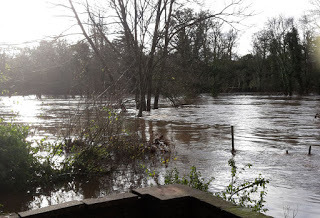 Retreating, but being in the house still feels like being on a boat.All day, as we waited for the river to go down, news came in of the devastation that Storm Desmond had wreaked. In Appleby people had been rescued from their houses by lifeboats as the water overwhelmed the flood defences.
Retreating, but being in the house still feels like being on a boat.All day, as we waited for the river to go down, news came in of the devastation that Storm Desmond had wreaked. In Appleby people had been rescued from their houses by lifeboats as the water overwhelmed the flood defences.
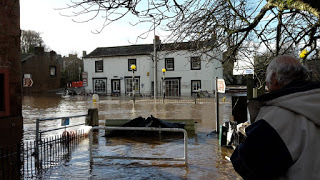 Appleby on Sunday afternoon, nearly two days after Storm Desmond began.All over Cumbria roads had been swept away, there were landslides, and bridges had collapsed under the force of the water. In Keswick, Cockermouth and Carlisle families were once more flooded out of their houses less than 5 years since the last time it had happened. Some communities in the lake district were completely cut off. Appleby was one of them.
Appleby on Sunday afternoon, nearly two days after Storm Desmond began.All over Cumbria roads had been swept away, there were landslides, and bridges had collapsed under the force of the water. In Keswick, Cockermouth and Carlisle families were once more flooded out of their houses less than 5 years since the last time it had happened. Some communities in the lake district were completely cut off. Appleby was one of them.
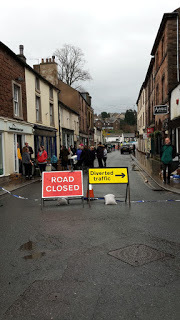
It was Monday before we could get into the town centre at all. As we (and many other people) live on the opposite side of the river to the shops, it was a 15 mile round trip to get to town because both bridges were closed waiting for an engineer's inspection.
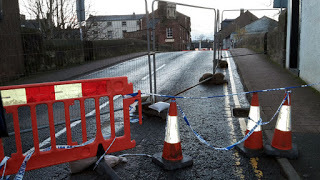
It was ridiculous to live only a few hundred yards from the town centre and have to drive miles to get a pint of milk! In Appleby the devastation that local businesses have suffered (some of them only recently opened) is heartbreaking. Small town shops struggle anyway and this could be a death blow to some of them - now facing months of closure. Jobs will inevitably be lost in an area that doesn't have a great deal of employment.
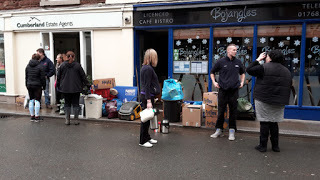 Mopping up on Monday.For us, the retreating flood water gradually revealed the extent of the damage. The watermarks on the walls told their own story. Our graceful 18th century ground floor windows had been smashed irreparably, two partition walls punched through by debris carried in the flood water, and the chipboard floor to the Mezzanine workshop and studio was sodden and spongy. A wooden floor over one of the former mill races had been ripped up and broken apart - the planks carried out on the tide. Outside, my garden fence and gate had been shredded and the garden was a waste land of mud and debris.
Mopping up on Monday.For us, the retreating flood water gradually revealed the extent of the damage. The watermarks on the walls told their own story. Our graceful 18th century ground floor windows had been smashed irreparably, two partition walls punched through by debris carried in the flood water, and the chipboard floor to the Mezzanine workshop and studio was sodden and spongy. A wooden floor over one of the former mill races had been ripped up and broken apart - the planks carried out on the tide. Outside, my garden fence and gate had been shredded and the garden was a waste land of mud and debris.
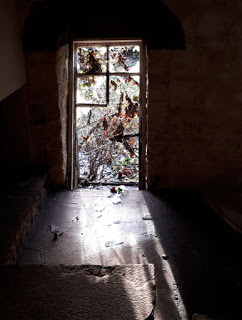
But the biggest shock was finally being able to open the door to the tenant's flat and see what families all over Cumbria were having to face. Furniture and personal items, sodden and muddy, tossed around and piled up by the flood water which had reached up almost to the ceiling. Cooker, fridge, washing machine and every other kitchen appliance completely ruined. We can't get flood insurance here, because we live on the river bank, virtually in the river, so replacements and repairs have to be funded ourselves and, like many others here, we face several months without income until the building can be dried out. Luckily most of the tenant's belongings, upstairs, were intact.
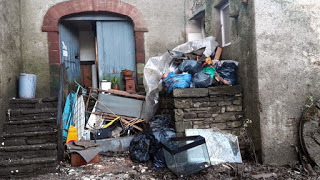 The aftermath.We count ourselves very fortunate that our living accommodation is untouched while so many people are homeless. There will be a lot of hardwork and financial angst, but at least we have a roof over our heads and a dry bed to climb into. All our worries are for the future. We were trying to sell the Mill and down-size, but no-one wants a building that floods. All over Cumbria, 'For Sale' signs are standing forlornly in drenched gardens and owners are being faced with the impossibility of moving. Climate change is making extreme weather events the norm. If this is a 1 degree increase in global temperatures then what will it be like when we reach the proposed 1.5 degrees? Most climate scientists say that unless we can stop all emissions now (which seems unlikely), we're on track for 2 degrees, which doesn't bear thinking about.
The aftermath.We count ourselves very fortunate that our living accommodation is untouched while so many people are homeless. There will be a lot of hardwork and financial angst, but at least we have a roof over our heads and a dry bed to climb into. All our worries are for the future. We were trying to sell the Mill and down-size, but no-one wants a building that floods. All over Cumbria, 'For Sale' signs are standing forlornly in drenched gardens and owners are being faced with the impossibility of moving. Climate change is making extreme weather events the norm. If this is a 1 degree increase in global temperatures then what will it be like when we reach the proposed 1.5 degrees? Most climate scientists say that unless we can stop all emissions now (which seems unlikely), we're on track for 2 degrees, which doesn't bear thinking about.
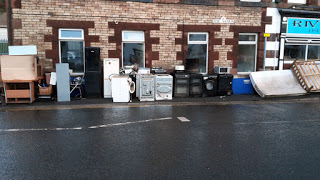 Some of our neighboursI used to love the sound of the rain pattering on the roof, but now it doesn't sound so sweet. We have been flooded 4 times in 15 years, though this was by far the worst. Storm Desmond brought a record rainfall for the British isles - recorded on Honister Pass in Cumbria at 341 mm of rain in 24 hours, which is about 14 inches. For hundreds of years, the millers have recorded flood levels on the sandstone cliff that the Mill is built into. Desmond is about 2 feet higher than any previous recorded level. So far the building has withstood the river's force, but every structure has its limits. That is what will keep me awake at night.
Some of our neighboursI used to love the sound of the rain pattering on the roof, but now it doesn't sound so sweet. We have been flooded 4 times in 15 years, though this was by far the worst. Storm Desmond brought a record rainfall for the British isles - recorded on Honister Pass in Cumbria at 341 mm of rain in 24 hours, which is about 14 inches. For hundreds of years, the millers have recorded flood levels on the sandstone cliff that the Mill is built into. Desmond is about 2 feet higher than any previous recorded level. So far the building has withstood the river's force, but every structure has its limits. That is what will keep me awake at night.
 Retreating, but being in the house still feels like being on a boat.All day, as we waited for the river to go down, news came in of the devastation that Storm Desmond had wreaked. In Appleby people had been rescued from their houses by lifeboats as the water overwhelmed the flood defences.
Retreating, but being in the house still feels like being on a boat.All day, as we waited for the river to go down, news came in of the devastation that Storm Desmond had wreaked. In Appleby people had been rescued from their houses by lifeboats as the water overwhelmed the flood defences. Appleby on Sunday afternoon, nearly two days after Storm Desmond began.All over Cumbria roads had been swept away, there were landslides, and bridges had collapsed under the force of the water. In Keswick, Cockermouth and Carlisle families were once more flooded out of their houses less than 5 years since the last time it had happened. Some communities in the lake district were completely cut off. Appleby was one of them.
Appleby on Sunday afternoon, nearly two days after Storm Desmond began.All over Cumbria roads had been swept away, there were landslides, and bridges had collapsed under the force of the water. In Keswick, Cockermouth and Carlisle families were once more flooded out of their houses less than 5 years since the last time it had happened. Some communities in the lake district were completely cut off. Appleby was one of them.
It was Monday before we could get into the town centre at all. As we (and many other people) live on the opposite side of the river to the shops, it was a 15 mile round trip to get to town because both bridges were closed waiting for an engineer's inspection.

It was ridiculous to live only a few hundred yards from the town centre and have to drive miles to get a pint of milk! In Appleby the devastation that local businesses have suffered (some of them only recently opened) is heartbreaking. Small town shops struggle anyway and this could be a death blow to some of them - now facing months of closure. Jobs will inevitably be lost in an area that doesn't have a great deal of employment.
 Mopping up on Monday.For us, the retreating flood water gradually revealed the extent of the damage. The watermarks on the walls told their own story. Our graceful 18th century ground floor windows had been smashed irreparably, two partition walls punched through by debris carried in the flood water, and the chipboard floor to the Mezzanine workshop and studio was sodden and spongy. A wooden floor over one of the former mill races had been ripped up and broken apart - the planks carried out on the tide. Outside, my garden fence and gate had been shredded and the garden was a waste land of mud and debris.
Mopping up on Monday.For us, the retreating flood water gradually revealed the extent of the damage. The watermarks on the walls told their own story. Our graceful 18th century ground floor windows had been smashed irreparably, two partition walls punched through by debris carried in the flood water, and the chipboard floor to the Mezzanine workshop and studio was sodden and spongy. A wooden floor over one of the former mill races had been ripped up and broken apart - the planks carried out on the tide. Outside, my garden fence and gate had been shredded and the garden was a waste land of mud and debris.
But the biggest shock was finally being able to open the door to the tenant's flat and see what families all over Cumbria were having to face. Furniture and personal items, sodden and muddy, tossed around and piled up by the flood water which had reached up almost to the ceiling. Cooker, fridge, washing machine and every other kitchen appliance completely ruined. We can't get flood insurance here, because we live on the river bank, virtually in the river, so replacements and repairs have to be funded ourselves and, like many others here, we face several months without income until the building can be dried out. Luckily most of the tenant's belongings, upstairs, were intact.
 The aftermath.We count ourselves very fortunate that our living accommodation is untouched while so many people are homeless. There will be a lot of hardwork and financial angst, but at least we have a roof over our heads and a dry bed to climb into. All our worries are for the future. We were trying to sell the Mill and down-size, but no-one wants a building that floods. All over Cumbria, 'For Sale' signs are standing forlornly in drenched gardens and owners are being faced with the impossibility of moving. Climate change is making extreme weather events the norm. If this is a 1 degree increase in global temperatures then what will it be like when we reach the proposed 1.5 degrees? Most climate scientists say that unless we can stop all emissions now (which seems unlikely), we're on track for 2 degrees, which doesn't bear thinking about.
The aftermath.We count ourselves very fortunate that our living accommodation is untouched while so many people are homeless. There will be a lot of hardwork and financial angst, but at least we have a roof over our heads and a dry bed to climb into. All our worries are for the future. We were trying to sell the Mill and down-size, but no-one wants a building that floods. All over Cumbria, 'For Sale' signs are standing forlornly in drenched gardens and owners are being faced with the impossibility of moving. Climate change is making extreme weather events the norm. If this is a 1 degree increase in global temperatures then what will it be like when we reach the proposed 1.5 degrees? Most climate scientists say that unless we can stop all emissions now (which seems unlikely), we're on track for 2 degrees, which doesn't bear thinking about. Some of our neighboursI used to love the sound of the rain pattering on the roof, but now it doesn't sound so sweet. We have been flooded 4 times in 15 years, though this was by far the worst. Storm Desmond brought a record rainfall for the British isles - recorded on Honister Pass in Cumbria at 341 mm of rain in 24 hours, which is about 14 inches. For hundreds of years, the millers have recorded flood levels on the sandstone cliff that the Mill is built into. Desmond is about 2 feet higher than any previous recorded level. So far the building has withstood the river's force, but every structure has its limits. That is what will keep me awake at night.
Some of our neighboursI used to love the sound of the rain pattering on the roof, but now it doesn't sound so sweet. We have been flooded 4 times in 15 years, though this was by far the worst. Storm Desmond brought a record rainfall for the British isles - recorded on Honister Pass in Cumbria at 341 mm of rain in 24 hours, which is about 14 inches. For hundreds of years, the millers have recorded flood levels on the sandstone cliff that the Mill is built into. Desmond is about 2 feet higher than any previous recorded level. So far the building has withstood the river's force, but every structure has its limits. That is what will keep me awake at night.
Published on December 16, 2015 01:30



